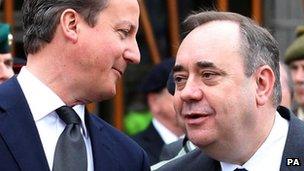David Cameron, Alex Salmond and Scotland's referendum
- Published
- comments

David Cameron and Alex Salmond, pictured in 2011
They shake hands. They smile for the cameras. They hail an agreement which allows the people of Scotland to determine their own future. However, both men will know that there can only be one winner.
Either David Cameron is set to become the last Prime Minister of this United Kingdom, or Alex Salmond is on course to be the first nationalist leader forced to admit that his country has rejected the chance to become an independent nation.
In a little over two years Mr Cameron could return to Edinburgh as the leader of a foreign country, or Mr Salmond could still be coming to London as just one of the leaders of one of the parts of the UK.
This is a decision which will affect people in Accrington as well as Aberdeen and Cardiff as well as Cowdenbeath. It will have an impact not just on the taxes raised and the money spent throughout the UK, but also on such diverse questions as the location of army, navy and airforce bases, how our interest rate is determined and, even, the future of the BBC.
If Scots vote for independence there would be a natural English Conservative majority in the rump UK. If they vote against, Scottish politics will, for the first time in decades, not be dominated by the promise or the threat of separation from the rest of the UK.
That finality is the real point of today's agreement which heralds the transferring of power from Westminster to Edinburgh to hold a simple yes/no independence referendum by the end of 2014. It is meant to ensure that there is no dispute, no confusion, no rival interpretations which could see a court of law rather than the people determine Scotland's destiny.
Yet, for all this talk of resolving the future once and for all, it is worth remembering that Scots will not be able to vote for what many say they want and what all the biggest parties here advocate - namely more powers for Scotland within the UK.
Many Unionists assume that today marks the beginning of the end of Alex Salmond's dream as the polls suggest that there is no majority for independence.
Providing he can hold his party together and ensure this vote is not seen as a referendum on him - both big ifs - Scotland's First Minister may consider more powers a pretty good consolation prize.